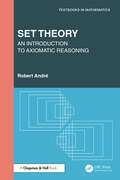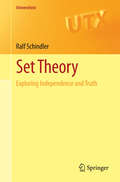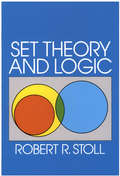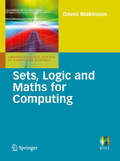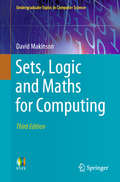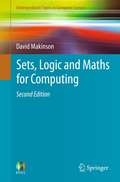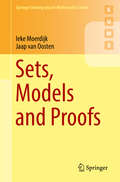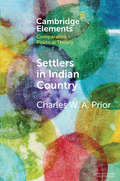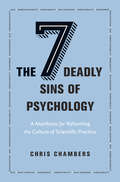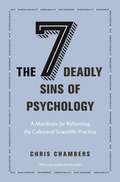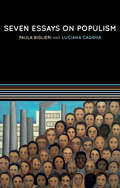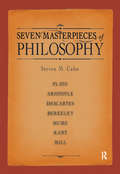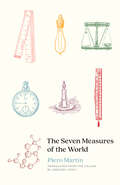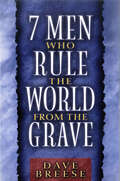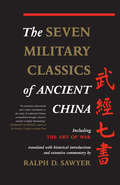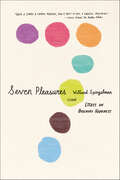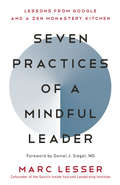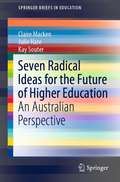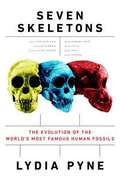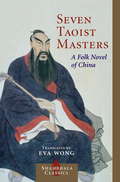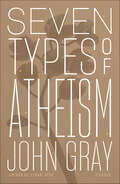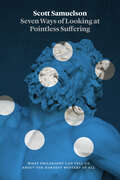- Table View
- List View
Set Theory: An Introduction to Axiomatic Reasoning (Textbooks in Mathematics)
by Robert AndréContemporary students of mathematics differ considerably from those of half a century ago. In spite of this, many textbooks written decades ago, and now considered to be “classics”, are still prescribed for students today. These texts are not suitable for today’s students. This text is meant for and written to today’s mathematics students. Set theory is a pure mathematics endeavor in the sense that it seems to have no immediate applications; yet the knowledge and skills developed in such a course can easily branch out to various fields of both pure mathematics and applied mathematics.Rather than transforming the reader into a practicing mathematician, this book is more designed to initiate the reader to what may be called “mathematical thinking” while developing knowledge about foundations of modern mathematics. Without this insight, becoming a practicing mathematician is much more daunting.The main objective is twofold. The students will develop some fundamental understanding of the foundations of mathematics and elements of set theory, in general. In the process, the student will develop skills in proving simple mathematical statements with “mathematical rigor”.Carefully presented detailed proofs and rigorous chains of logical arguments will guide the students from the fundamental ZFC-axioms and definitions to show why a basic mathematical statement must hold true. The student will recognize the role played by each fundamental axiom in development of modern mathematics. The student will learn to distinguish between a correct mathematical proof and an erroneous one. The subject matter is presented while bypassing the complexities encountered when using formal logic.
Set Theory
by Ralf SchindlerThis textbook gives an introduction to axiomatic set theory and examines the prominent questions that are relevant in current research in a manner that is accessible to students. Its main theme is the interplay of large cardinals, inner models, forcing and descriptive set theory. The following topics are covered: * Forcing and constructability * The Solovay-Shelah Theorem i. e. the equiconsistency of 'every set of reals is Lebesgue measurable' with one inaccessible cardinal * Fine structure theory and a modern approach to sharps * Jensen's Covering Lemma * The equivalence of analytic determinacy with sharps * The theory of extenders and iteration trees * A proof of projective determinacy from Woodin cardinals. Set Theory requires only a basic knowledge of mathematical logic and will be suitable for advanced students and researchers.
Set Theory and Logic
by Robert R. StollSet Theory and Logic is the result of a course of lectures for advanced undergraduates, developed at Oberlin College for the purpose of introducing students to the conceptual foundations of mathematics. Mathematics, specifically the real number system, is approached as a unity whose operations can be logically ordered through axioms. One of the most complex and essential of modern mathematical innovations, the theory of sets (crucial to quantum mechanics and other sciences), is introduced in a most careful concept manner, aiming for the maximum in clarity and stimulation for further study in set logic. Contents include: Sets and Relations -- Cantor's concept of a set, etc.Natural Number Sequence -- Zorn's Lemma, etc.Extension of Natural Numbers to Real NumbersLogic -- the Statement and Predicate Calculus, etc.Informal Axiomatic MathematicsBoolean AlgebraInformal Axiomatic Set TheorySeveral Algebraic Theories -- Rings, Integral Domains, Fields, etc.First-Order Theories -- Metamathematics, etc.Symbolic logic does not figure significantly until the final chapter. The main theme of the book is mathematics as a system seen through the elaboration of real numbers; set theory and logic are seen s efficient tools in constructing axioms necessary to the system. Mathematics students at the undergraduate level, and those who seek a rigorous but not unnecessarily technical introduction to mathematical concepts, will welcome the return to print of this most lucid work. "Professor Stoll . . . has given us one of the best introductory texts we have seen." -- Cosmos. "In the reviewer's opinion, this is an excellent book, and in addition to its use as a textbook (it contains a wealth of exercises and examples) can be recommended to all who wish an introduction to mathematical logic less technical than standard treatises (to which it can also serve as preliminary reading)." -- Mathematical Reviews.
Sets, Logic and Maths for Computing
by David MakinsonThis easy-to-follow textbook introduces the mathematical language, knowledge and problem-solving skills that undergraduates need to study computing. The language is in part qualitative, with concepts such as set, relation, function and recursion/induction; but it is also partly quantitative, with principles of counting and finite probability. Entwined with both are the fundamental notions of logic and their use for representation and proof. Features: teaches finite math as a language for thinking, as much as knowledge and skills to be acquired; uses an intuitive approach with a focus on examples for all general concepts; brings out the interplay between the qualitative and the quantitative in all areas covered, particularly in the treatment of recursion and induction; balances carefully the abstract and concrete, principles and proofs, specific facts and general perspectives; includes highlight boxes that raise common queries and clear confusions; provides numerous exercises, with selected solutions.
Sets, Logic and Maths for Computing (Undergraduate Topics in Computer Science)
by David MakinsonThis easy-to-understand textbook introduces the mathematical language and problem-solving tools essential to anyone wishing to enter the world of computer and information sciences. Specifically designed for the student who is intimidated by mathematics, the book offers a concise treatment in an engaging style.The thoroughly revised third edition features a new chapter on relevance-sensitivity in logical reasoning and many additional explanations on points that students find puzzling, including the rationale for various shorthand ways of speaking and ‘abuses of language’ that are convenient but can give rise to misunderstandings. Solutions are now also provided for all exercises.Topics and features: presents an intuitive approach, emphasizing how finite mathematics supplies a valuable language for thinking about computation; discusses sets and the mathematical objects built with them, such as relations and functions, as well as recursion and induction; introduces core topics of mathematics, including combinatorics and finite probability, along with the structures known as trees; examines propositional and quantificational logic, how to build complex proofs from simple ones, and how to ensure relevance in logic; addresses questions that students find puzzling but may have difficulty articulating, through entertaining conversations between Alice and the Mad Hatter; provides an extensive set of solved exercises throughout the text.This clearly-written textbook offers invaluable guidance to students beginning an undergraduate degree in computer science. The coverage is also suitable for courses on formal methods offered to those studying mathematics, philosophy, linguistics, economics, and political science. Assuming only minimal mathematical background, it is ideal for both the classroom and independent study.
Sets, Logic and Maths for Computing, 2nd Ed.
by David MakinsonThis easy-to-follow textbook introduces the mathematical language, knowledge and problem-solving skills that undergraduates need to study computing. The language is in part qualitative, with concepts such as set, relation, function and recursion/induction; but it is also partly quantitative, with principles of counting and finite probability. Entwined with both are the fundamental notions of logic and their use for representation and proof. Features: teaches finite math as a language for thinking, as much as knowledge and skills to be acquired; uses an intuitive approach with a focus on examples for all general concepts; brings out the interplay between the qualitative and the quantitative in all areas covered, particularly in the treatment of recursion and induction; balances carefully the abstract and concrete, principles and proofs, specific facts and general perspectives; includes highlight boxes that raise common queries and clear confusions; provides numerous exercises, with selected solutions.
Sets, Models and Proofs (Springer Undergraduate Mathematics Series)
by Ieke Moerdijk Jaap Van OostenThis textbook provides a concise and self-contained introduction to mathematical logic, with a focus on the fundamental topics in first-order logic and model theory. Including examples from several areas of mathematics (algebra, linear algebra and analysis), the book illustrates the relevance and usefulness of logic in the study of these subject areas.The authors start with an exposition of set theory and the axiom of choice as used in everyday mathematics. Proceeding at a gentle pace, they go on to present some of the first important results in model theory, followed by a careful exposition of Gentzen-style natural deduction and a detailed proof of Gödel’s completeness theorem for first-order logic. The book then explores the formal axiom system of Zermelo and Fraenkel before concluding with an extensive list of suggestions for further study. The present volume is primarily aimed at mathematics students who are already familiar with basic analysis, algebra and linear algebra. It contains numerous exercises of varying difficulty and can be used for self-study, though it is ideally suited as a text for a one-semester university course in the second or third year.
Setting the People Free: The Story of Democracy
by John DunnWhy does democracy—as a word and as an idea—loom so large in the political imagination, though it has so often been misused and misunderstood? Setting the People Free starts by tracing the roots of democracy from an improvised remedy for a local Greek difficulty 2,500 years ago, through its near extinction, to its rebirth amid the struggles of the French Revolution. Celebrated political theorist John Dunn then charts the slow but insistent metamorphosis of democracy over the next 150 years and its apparently overwhelming triumph since 1945. He examines the differences and the extraordinary continuities that modern democratic states share with their Greek antecedents and explains why democracy evokes intellectual and moral scorn for some, and vital allegiance from others. Now with a new preface and conclusion that ground this landmark work firmly in the present, Setting the People Free is a unique and brilliant account of an extraordinary idea.
Settlers in Indian Country: Sovereignty and Indigenous Power in Early America (Elements in Comparative Political Theory)
by Charles W. PriorThe aim of this Element is to foreground Native American conceptions of sovereignty and power in order to refine the place of settler colonialism in American colonial and early republican history. It argues that Indigenous concepts of sovereignty were rooted in complex metaphorical language, in historical understandings of alliance, and in mobility in a landscape of layered interconnections of power. Where some versions of the interpretive paradigm of settler colonialism emphasise the violent 'elimination of the native', this work reveals that diplomatic transactions between the Iroquois Confederacy and British colonial and imperial agents reveal a hybrid language of alliance, sovereignty and territory. These languages and concepts of inter-cultural diplomacy provide contexts that suggest a more nuanced and dynamic relationship between colonialism and Indigenous power.
The Seven Deadly Sins of Psychology: A Manifesto for Reforming the Culture of Scientific Practice
by Chris ChambersWhy psychology is in peril as a scientific discipline—and how to save itPsychological science has made extraordinary discoveries about the human mind, but can we trust everything its practitioners are telling us? In recent years, it has become increasingly apparent that a lot of research in psychology is based on weak evidence, questionable practices, and sometimes even fraud. The Seven Deadly Sins of Psychology diagnoses the ills besetting the discipline today and proposes sensible, practical solutions to ensure that it remains a legitimate and reliable science in the years ahead.In this unflinchingly candid manifesto, Chris Chambers draws on his own experiences as a working scientist to reveal a dark side to psychology that few of us ever see. Using the seven deadly sins as a metaphor, he shows how practitioners are vulnerable to powerful biases that undercut the scientific method, how they routinely torture data until it produces outcomes that can be published in prestigious journals, and how studies are much less reliable than advertised. He reveals how a culture of secrecy denies the public and other researchers access to the results of psychology experiments, how fraudulent academics can operate with impunity, and how an obsession with bean counting creates perverse incentives for academics. Left unchecked, these problems threaten the very future of psychology as a science—but help is here.Outlining a core set of best practices that can be applied across the sciences, Chambers demonstrates how all these sins can be corrected by embracing open science, an emerging philosophy that seeks to make research and its outcomes as transparent as possible.
The Seven Deadly Sins of Psychology: A Manifesto for Reforming the Culture of Scientific Practice
by Chris ChambersWhy psychology is in peril as a scientific discipline—and how to save itPsychological science has made extraordinary discoveries about the human mind, but can we trust everything its practitioners are telling us? In recent years, it has become increasingly apparent that a lot of research in psychology is based on weak evidence, questionable practices, and sometimes even fraud. The Seven Deadly Sins of Psychology diagnoses the ills besetting the discipline today and proposes sensible, practical solutions to ensure that it remains a legitimate and reliable science in the years ahead. In this unflinchingly candid manifesto, Chris Chambers shows how practitioners are vulnerable to powerful biases that undercut the scientific method, how they routinely torture data until it produces outcomes that can be published in prestigious journals, and how studies are much less reliable than advertised. Left unchecked, these and other problems threaten the very future of psychology as a science—but help is here.
Seven Essays on Populism: For a Renewed Theoretical Perspective (Critical South)
by Paula Biglieri Luciana CadahiaThis important intervention interrogates keystone features of the dominant European theoretical landscape in the field of populism studies, advancing existing debates and introducing new avenues of thought, in conjunction with insights from the contemporary Latin American political experience and perspectives. In each essay – the title a nod to the influential socialist thinker José Carlos Mariátegui, from whom the authors draw inspiration – leading Argentine scholars Paula Biglieri and Luciana Cadahia pair key dimensions of populism with diverse themes such as modern-day feminism, militancy, and neoliberalism, in order to stimulate discussion surrounding the constitutive nature, goals, and potential of populist social movements. Biglieri and Cadahia are unafraid to court provocation in their frank assessment of populism as a force which could bring about essential emancipatory social change to confront emerging right-wing trends in policy and leadership. At the same time, this fresh interpretation of a much-maligned political articulation is balanced by their denunciation of right-aligned populisms and their failure to bring to bear a sustainable alternative to contemporary neo-authoritarian forms of neoliberalism. In their place, they articulate a populism which offers a viable means of mobilizing a response to hegemonic forms of neoliberal discourse and government.
Seven Masterpieces of Philosophy
by Steven M. CahnThis highly anticipated anthology, compiled by noted author and scholar Steven Cahn, presents the seven major works central to any introductory philosophy course in their entirety. Each work has had a profound influence on philosophical thought, and the authors are generally regarded as among the world’s greatest philosophers. Seven Masterpieces in Philosophy features the most well-respected and admired translations, and offers introductions and annotations by Steven Cahn. Anyone seeking to understand the challenges of philosophy could hardly do better than concentrate attention on these seven masterpieces. A great alternative to larger tomes, this book allows the instructor to supplement these works with additional materials of their choosing.
The Seven Measures of the World
by Piero MartinThe fascinating stories behind the essential seven units of measurement that allow us to understand the physical world “Entertaining popular science and a literate tale of why things are as they are.”—Kirkus Reviews From the beginning of history, measurement has been interwoven into the human experience, shaping our understanding of nature, personal relationships, and the supernatural. We measure the world to know our past, comprehend the present, and plan the future. Renowned physicist Piero Martin explores how scientific knowledge is built around seven key pillars of measurement: the meter for length; the second for time; the kilogram for mass; the kelvin for temperature; the ampere for electricity; the mole for quantity of substance; and the candela for luminous intensity. Martin examines the history and function of these units and illustrates their applications in rich vignettes on a range of topics—from quarks to black holes, from a glass of wine to space exploration. He delves into not only the all-important numbers but also anecdotes that underline each unit’s special quality. At the same time, he explains how each unit contributes to important aspects of science, from classical physics to quantum mechanics, from relativity to chemistry, from cosmology to elementary particle physics, and from medicine to modern technology. Martin eloquently shows how the entire universe can be measured and understood using just seven units.
Seven Men Who Rule the World From the Grave
by Dave BreeseThough their bodies lie cold and dormant, the grave cannot contain the influence these seven men have had on today's world. They continue to rule because they have altered the thinking of society. They generated philosophies that have been ardently grasped by masses of people but are erroneous and antiscriptural. Today these ideas pervade our schools, businesses, homes, and even the church. As we continue to unknowingly subscribe to their philosophies, we keep the grave open for Charles Darwin, Karl Marx, Julius Wellhausen, John Dewey, Sigmund Freud, John Maynard Keynes, and Soren Kierkegaard. Dave Breese warns us of the dangers of believing unreservedly the ideas of these seven men. He also reminds us of the only man whose life and words we can trust completely- Jesus Christ.
Seven Men Who Rule the World From the Grave
by Dave BreeseThough their bodies lie cold and dormant, the grave cannot contain the influence these seven men have had on today's world. They continue to rule because they have altered the thinking of society. They generated philosophies that have been ardently grasped by masses of people but are erroneous and antiscriptural. Today these ideas pervade our schools, businesses, homes, and even the church. As we continue to unknowingly subscribe to their philosophies, we keep the grave open for Charles Darwin, Karl Marx, Julius Wellhausen, John Dewey, Sigmund Freud, John Maynard Keynes, and Soren Kierkegaard. Dave Breese warns us of the dangers of believing unreservedly the ideas of these seven men. He also reminds us of the only man whose life and words we can trust completely- Jesus Christ.
The Seven Military Classics Of Ancient China
by Ralph D. SawyerThe Seven Military Classics is one of the most profound studies of warfare ever written, a stanchion in sinological and military history. It presents an Eastern tradition of strategic thought that emphasizes outwitting one's opponent through speed, stealth, flexibility, and a minimum of force--an approach very different from that stressed in the West. Safeguarded for centuries by the ruling elite of imperial China, even in modern times these writings have been known only to a handful of Western specialists.This volume contains seven separate essays, written between 500 BCE and 700 CE, that preserve the essential tenets of strategy distilled from the experience of the most brilliant warriors of ancient China.
The Seven Pillars of Statistical Wisdom
by Stephen M. StiglerWhat gives statistics its unity as a science? Stephen Stigler sets forth the seven foundational ideas of statistics--a scientific discipline related to but distinct from mathematics and computer science and one which often seems counterintuitive. His original account will fascinate the interested layperson and engage the professional statistician.
Seven Pleasures: Essays on Ordinary Happiness
by Willard SpiegelmanWhat does it mean to be happy? Americans have had an obsession with "the pursuit of happiness" ever since the Founding Fathers enshrined it—along with life and liberty—as our national birthright. Whether it means the accumulation of wealth or a more vaguely understood notion of self-fulfillment or self-actualization, happiness has been an inevitable, though elusive, goal.But it is hard to separate "real" happiness from the banal self-help version that embraces mindless positive thinking. And though we have two booming "happiness industries"—religion, with its promise of salvation, and psychopharmacology, with its promise of better living through chemistry—each comes with its own problems and complications.In Seven Pleasures, Willard Spiegelman takes a look at the possibilities for achieving ordinary secular happiness without recourse to either religion or drugs. In this erudite and frequently hilarious book of essays, he discusses seven activities that lead naturally and easily to a sense of well-being. One of these—dancing—requires a partner, and therefore provides a lesson in civility, or good citizenship, as one of its benefits. The other six—reading, walking, looking, listening, swimming, and writing—are things one performs alone. Seven Pleasures is a marvelously engaging guide to the pursuit of happiness, and all its accompanying delights.
Seven Practices of a Mindful Leader: Lessons from Google and a Zen Monastery Kitchen
by Marc LesserWhat would your work and your life look like if you knew how to stay focused yet flexible, if you got more of the right things done, and if you were helping to create a more peaceful world at the same time? &“A mindful leader makes the work environment a generative social field in which compassion, connection, and creativity thrive. The seven accessible practices in this book can teach you how to become just such a leader.&” — from the foreword by Daniel J. Siegel, MD, executive director of Mindsight Institute Today&’s leaders are grappling with the pace and complexity of change, the challenge of supporting healthy collaboration and alignment among teams, and the resulting stress and burnout. The practice of mindful leadership may be one of the most important competencies in business today if leaders are to move beyond fear, anxiety, nagging self-doubt, and the feeling of constant overwhelm. Marc Lesser has taught his proven seven-step method to leaders at Google, Genentech, SAP, Facebook, and dozens of other Fortune 500 companies for over twenty years and has distilled a lifetime of mindfulness and business experience into these chapters. This incredibly practical yet accessible book draws on Marc&’s experience as a CEO of three companies, as cofounder of the world-renowned Search Inside Yourself (SIY) program within Google, and as a longtime Zen practitioner. The principles in this book can be applied to leadership at any level, providing readers with the tools they need to shift awareness, enhance communication, build trust, eliminate fear and self-doubt, and minimize unnecessary workplace drama. Embracing any one of the seven practices alone can be life-changing. When used together, they support a path of well-being, productivity, and positive influence. Practicing mindful leadership will allow you to achieve results — with more energy, clarity, meaning, and connection. Your intentions and actions will be more aligned. You will accomplish more with less wasted effort. After reading this book, you&’ll understand why some of the world&’s most successful companies routinely incorporate the Seven Practices of a Mindful Leader, integrating mindfulness, emotional intelligence, and business savvy to create great corporate cultures, and even a better world.
Seven Radical Ideas for the Future of Higher Education: An Australian Perspective (SpringerBriefs in Education)
by Claire Macken Julie Hare Kay SouterThis book focuses on the disruption of the tertiary higher education system as a result of societal changes occasioned by the Fourth Industrial Revolution and hastened by COVID-19. It takes the view that higher education is on an inevitable trajectory of disruption as a result of globalisation, technological disruption, and disaggregation of the formal education sector but that it must not lose sight of its central role in equipping current and future students for the new economy. The book takes a student-centric - and big-picture approach - examining some of the biggest challenges facing massified higher education systems. The authors consider ways to achieve modern, responsive and efficient higher education systems globally that are economically sound for governments and affordable for individuals.
Seven Skeletons: The Evolution of the World's Most Famous Human Fossils
by Lydia PyneAn irresistible journey of discovery, science, history, and myth making, told through the lives and afterlives of seven famous human ancestorsOver the last century, the search for human ancestors has spanned four continents and resulted in the discovery of hundreds of fossils. While most of these discoveries live quietly in museum collections, there are a few that have become world-renowned celebrity personas--ambassadors of science that speak to public audiences. In Seven Skeletons, historian of science Lydia Pyne explores how seven such famous fossils of our ancestors have the social cachet they enjoy today.Drawing from archives, museums, and interviews, Pyne builds a cultural history for each celebrity fossil--from its discovery to its afterlife in museum exhibits to its legacy in popular culture. These seven include the three-foot tall "hobbit" from Flores, the Neanderthal of La Chapelle, the Taung Child, the Piltdown Man hoax, Peking Man, Australopithecus sediba, and Lucy--each embraced and celebrated by generations, and vivid examples of how discoveries of how our ancestors have been received, remembered, and immortalized. With wit and insight, Pyne brings to life each fossil, and how it is described, put on display, and shared among scientific communities and the broader public. This fascinating, endlessly entertaining book puts the impact of paleoanthropology into new context, a reminder of how our past as a species continues to affect, in astounding ways, our present culture and imagination.From the Hardcover edition.
Seven Taoist Masters: A Folk Novel of China
by Eva WongHistory and legend are interwoven in this folk novel that both entertains and instructs. Written by an unknown author, Seven Taoist Masters is the story of six men and one woman who overcome tremendous hardships on the journey to self-mastery. These characters and their teacher, Wang Ch'ung-yang, are all historical figures who lived in the Southern Sung (1127-1279) and Yuan (1271-1368) dynasties. Wang is regarded as the greatest patriarch of the Complete Reality school, a highly purified branch of Taoism having a strong affinity with Zen Buddhism. The novel brings to life the essentials of Taoist philosophy and practice, both through the instructions offered by Wang--on topics such as the cultivation of mind and body, meditation techniques, and overcoming the obstacles to enlightenment--and through the experiences of the characters.
Seven Types of Atheism
by John GrayFrom the provocative author of Straw Dogs comes an incisive, surprising intervention in the political and scientific debate over religion and atheismWhen you explore older atheisms, you will find that some of your firmest convictions—secular or religious—are highly questionable. If this prospect disturbs you, what you are looking for may be freedom from thought.For a generation now, public debate has been corroded by a shrill, narrow derision of religion in the name of an often vaguely understood “science.” John Gray’s stimulating and enjoyable new book, Seven Types of Atheism, describes the complex, dynamic world of older atheisms, a tradition that is, he writes, in many ways intertwined with and as rich as religion itself.Along a spectrum that ranges from the convictions of “God-haters” like the Marquis de Sade to the mysticism of Arthur Schopenhauer, from Bertrand Russell’s search for truth in mathematics to secular political religions like Jacobinism and Nazism, Gray explores the various ways great minds have attempted to understand the questions of salvation, purpose, progress, and evil. The result is a book that sheds an extraordinary light on what it is to be human.
Seven Ways of Looking at Pointless Suffering: What Philosophy Can Tell Us about the Hardest Mystery of All
by Scott SamuelsonIt’s right there in the Book of Job: “Man is born unto trouble as the sparks fly upward.” Suffering is an inescapable part of the human condition—which leads to a question that has proved just as inescapable throughout the centuries: Why? Why do we suffer? Why do people die young? Is there any point to our pain, physical or emotional? Do horrors like hurricanes have meaning? In Seven Ways of Looking at Pointless Suffering, Scott Samuelson tackles that hardest question of all. To do so, he travels through the history of philosophy and religion, but he also attends closely to the real world we live in. While always taking the question of suffering seriously, Samuelson is just as likely to draw lessons from Bugs Bunny as from Confucius, from his time teaching philosophy to prisoners as from Hannah Arendt’s attempts to come to terms with the Holocaust. He guides us through the arguments people have offered to answer this fundamental question, explores the many ways that we have tried to minimize or eliminate suffering, and examines people’s attempts to find ways to live with pointless suffering. Ultimately, Samuelson shows, to be fully human means to acknowledge a mysterious paradox: we must simultaneously accept suffering and oppose it. And understanding that is itself a step towards acceptance. Wholly accessible, and thoroughly thought-provoking, Seven Ways of Looking at Pointless Suffering is a masterpiece of philosophy, returning the field to its roots—helping us see new ways to understand, explain, and live in our world, fully alive to both its light and its darkness.
